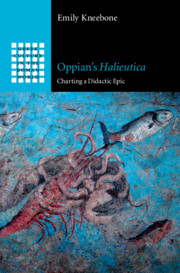Book contents
- Oppian’s Halieutica
- Greek Culture in the Roman World
- Oppian’s Halieutica
- Copyright page
- Epigraph
- Contents
- Acknowledgements
- Introduction: On Fishing
- Part I Didactic Poetry
- Part II Morality at Sea
- Chapter 4 Guile
- Chapter 5 Greed
- Chapter 6 Lust
- Part III Humans and Animals
- Part IV The World Is a Sea
- Bibliography
- Subject Index
- Index Locorum
Chapter 5 - Greed
from Part II - Morality at Sea
Published online by Cambridge University Press: 24 September 2020
- Oppian’s Halieutica
- Greek Culture in the Roman World
- Oppian’s Halieutica
- Copyright page
- Epigraph
- Contents
- Acknowledgements
- Introduction: On Fishing
- Part I Didactic Poetry
- Part II Morality at Sea
- Chapter 4 Guile
- Chapter 5 Greed
- Chapter 6 Lust
- Part III Humans and Animals
- Part IV The World Is a Sea
- Bibliography
- Subject Index
- Index Locorum
Summary
Several of the themes that have emerged in the exploration of guile and trickery in Chapter 4 – Oppian’s emphasis on the Odyssean qualities of fishing, as well as a fascination with short-sighted or impulsive behaviour and its evil consequences – take on particular force in the third book of the Halieutica, which turns from cunning to greed, and from fish to fishing. Fish, we are told, are inescapably σιφλός – deficient, lazy, gluttonous, blindly self-destructive –1 and the fisherman’s use of bait turns the creatures’ own appetites against them, exploiting their precipitous passions.
- Type
- Chapter
- Information
- Oppian's HalieuticaCharting a Didactic Epic, pp. 145 - 166Publisher: Cambridge University PressPrint publication year: 2020

